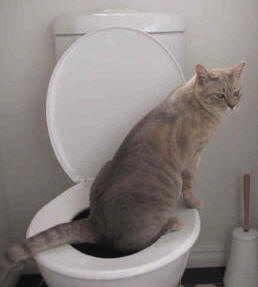Potential Issues of Flushing Cat Poop Down Your Toilet - Protect Your Plumbing
Potential Issues of Flushing Cat Poop Down Your Toilet - Protect Your Plumbing
Blog Article
What're your thoughts about Can You Flush Cat Poop Down The Toilet??

Introduction
As cat owners, it's important to bear in mind just how we deal with our feline pals' waste. While it may seem convenient to flush feline poop down the bathroom, this method can have detrimental effects for both the setting and human wellness.
Alternatives to Flushing
The good news is, there are safer and much more liable methods to deal with feline poop. Consider the adhering to options:
1. Scoop and Dispose in Trash
The most common method of disposing of feline poop is to scoop it right into a biodegradable bag and toss it in the garbage. Be sure to make use of a devoted clutter inside story and dispose of the waste immediately.
2. Use Biodegradable Litter
Opt for naturally degradable cat trash made from materials such as corn or wheat. These litters are eco-friendly and can be safely thrown away in the garbage.
3. Hide in the Yard
If you have a yard, take into consideration burying cat waste in a designated location far from vegetable yards and water sources. Be sure to dig deep enough to avoid contamination of groundwater.
4. Install a Pet Waste Disposal System
Buy an animal garbage disposal system particularly designed for cat waste. These systems utilize enzymes to break down the waste, lowering odor and ecological impact.
Health and wellness Risks
In addition to ecological worries, flushing feline waste can likewise posture health risks to humans. Cat feces may contain Toxoplasma gondii, a parasite that can create toxoplasmosis-- a possibly extreme disease, especially for expectant females and individuals with damaged body immune systems.
Environmental Impact
Flushing cat poop introduces hazardous pathogens and parasites into the water system, posturing a considerable danger to aquatic environments. These impurities can negatively impact aquatic life and compromise water top quality.
Conclusion
Responsible family pet ownership expands past supplying food and sanctuary-- it also includes proper waste monitoring. By refraining from purging cat poop down the toilet and opting for alternate disposal methods, we can minimize our ecological impact and protect human health.
Why Can’t I Flush Cat Poop?
It Spreads a Parasite
Cats are frequently infected with a parasite called toxoplasma gondii. The parasite causes an infection called toxoplasmosis. It is usually harmless to cats. The parasite only uses cat poop as a host for its eggs. Otherwise, the cat’s immune system usually keeps the infection at low enough levels to maintain its own health. But it does not stop the develop of eggs. These eggs are tiny and surprisingly tough. They may survive for a year before they begin to grow. But that’s the problem.
Our wastewater system is not designed to deal with toxoplasmosis eggs. Instead, most eggs will flush from your toilet into sewers and wastewater management plants. After the sewage is treated for many other harmful things in it, it is typically released into local rivers, lakes, or oceans. Here, the toxoplasmosis eggs can find new hosts, including starfish, crabs, otters, and many other wildlife. For many, this is a significant risk to their health. Toxoplasmosis can also end up infecting water sources that are important for agriculture, which means our deer, pigs, and sheep can get infected too.
Is There Risk to Humans?
There can be a risk to human life from flushing cat poop down the toilet. If you do so, the parasites from your cat’s poop can end up in shellfish, game animals, or livestock. If this meat is then served raw or undercooked, the people who eat it can get sick.
In fact, according to the CDC, 40 million people in the United States are infected with toxoplasma gondii. They get it from exposure to infected seafood, or from some kind of cat poop contamination, like drinking from a stream that is contaminated or touching anything that has come into contact with cat poop. That includes just cleaning a cat litter box.
Most people who get infected with these parasites will not develop any symptoms. However, for pregnant women or for those with compromised immune systems, the parasite can cause severe health problems.
How to Handle Cat Poop
The best way to handle cat poop is actually to clean the box more often. The eggs that the parasite sheds will not become active until one to five days after the cat poops. That means that if you clean daily, you’re much less likely to come into direct contact with infectious eggs.
That said, always dispose of cat poop in the garbage and not down the toilet. Wash your hands before and after you clean the litter box, and bring the bag of poop right outside to your garbage bins.
https://trenchlesssolutionsusa.com/why-cant-i-flush-cat-poop/

Do you appreciate reading about Can You Flush Cat Poop Down The Toilet?? Place feedback further down. We would be interested to hear your feelings about this write up. We hope that you come back again in the near future. Sharing is caring. Who knows, you might be doing someone a favor. Thanks for your time. Please stop by our site back soon.
Give Me A Quote! Report this page